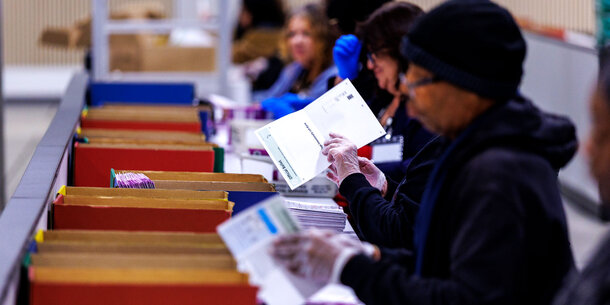As the Department of Homeland Security prepares to issue reports about the integrity of state election systems in the coming months, the public should be on the lookout for familiar tactics used by election deniers to spread false or misleading narratives.
Since starting his second term, President Trump has engaged in a broad attempt to illegally assert control over these systems. As part of this effort, in March, he ordered DHS to report on the security of all election technology and review state voter rolls for unqualified voters. Months later, the department quietly updated its organizational chart to include a new position: deputy assistant secretary for elections integrity.
The role was filled by Heather Honey, an activist known for promoting false information about Pennsylvania elections, including the repeatedly debunked claim that the state had more votes than voters in the 2020 election. Journalists, election officials, and other experts who have scrutinized her work have found a consistent pattern of misusing data to fit predetermined narratives. Following her appointment to DHS, Honey held a call with election officials from nearly all 50 states, where she reportedly echoed false claims that there had been widespread fraud in the 2020 election and referenced a report that falsely suggested that voting machines were rigged.
Since 2017, DHS and the Cybersecurity and Information Security Agency, which is part of DHS, have helped states protect their election infrastructure by offering election officials resources and services, alerting them to threats from criminals and foreign adversaries, and promoting information sharing across states and levels of government. But now, the credibility DHS built up is in question.
After an election website in Arizona was hacked, state officials contacted several state and federal partner agencies but did not reach out to any part of DHS because of reliability concerns. Following Honey’s appointment, Arizona Secretary of State Adrian Fontes warned of further damage to these relationships: “When the agency gives a platform to individuals who have actively worked to erode public trust, it becomes harder to view DHS as a reliable partner in election security.”
Experts who have examined Honey’s previous claims have found familiar tactics used by election deniers to spread false or misleading narratives. These often involve pointing to actual events and data to give a veneer of legitimacy to baseless theories and featuring misleading titles and headers that misrepresent the actual findings. Going forward, journalists, state and local officials, and the public must take into account DHS’s damaged credibility as context for claims about the security of election systems. Here are some of the techniques to watch out for.
Cherry-Picked Data
Honey played a central role in efforts to discredit the Electronic Registration Information Center (ERIC), an organization supported by a bipartisan coalition of election officials. ERIC uses matching technology and data from various federal and state sources to help states maintain more accurate voter rolls, reducing the risk that valid registrants will be purged while also making it easier to catch the rare instances of fraud. But conspiracy theories have prompted several Republican-led states to withdraw from the cooperative in recent years, citing.
An independent analysis by Votebeat and Spotlight PA found that Honey’s claims about ERIC omitted metrics that would have significantly altered her findings. For example, she claimed that “there is no evidence that [ERIC] has led to an improvement in accuracy or clean voter rolls.” But in support of this claim, Honey focused solely on removals related to address changes and ignored other categories for removal. Moreover, she only cited data from 2020, which is an outlier year — data from 2014, 2016, 2018, and even 2022 showed that ERIC member states removed more voters related to address changes than non-ERIC states.
Using the same dataset available to Honey, Votebeat and Spotlight PA conducted an analysis that included all relevant metrics from each year. Their findings directly contradicted her conclusion and found that states using ERIC have removed a higher percentage of ineligible voters from the rolls than non-ERIC states.
Misrepresentation of Election Systems and Processes
Honey has often cited official election data to support her claims, but her conclusions are faulty. For example, the Pennsylvania Department of State explained that Honey’s widely repeated claim that the number of ballots cast in Pennsylvania’s 2020 election exceeded the number of voters was based on a state voting history database that was incomplete because some large counties had not finished uploading their data on the number of participating voters. Moreover, voter roll data is constantly updated as voters move or become ineligible to vote in the state; a single snapshot of that data wouldn’t produce an exact tally of voter participation in a given election.
Additionally, in the lead-up to the 2022 midterms, Honey falsely claimed that Pennsylvania sent 255,000 ballots to unverified voters, citing ballot applications that had been marked “not verified” in internal election systems. The Pennsylvania Department of State explained that this internal label was actually a security feature, not a lapse. Mail-in and absentee ballot applications are marked “not verified” to flag that officials must go through additional steps to verify the voter’s identity before their ballot can be counted.
Honey has failed to update or withdraw her claims even after election officials have explained why the allegations are false or deceptive.
Misleading Report Titles and Headings
Honey also participated in the deeply flawed and partisan 2021 audit of election results in Maricopa County, Arizona, run by the company Cyber Ninjas. Emails suggest that she likely contributed to the company’s report. As the Brennan Center has explained that report used headings and titles that overstated or conflicted with its actual findings.
For example, the authors used the heading “In-Person Voters Who Had Moved out of Maricopa County” for one category of findings to insinuate that individuals may have voted illegally. But in the body text, they conceded that the commercial address verification service they utilized was prone to errors and failed to distinguish between temporary and permanent moves, which have differing consequences for voter eligibility. Similarly, the heading “More Ballots Returned by Voter Than Received” suggested that voters were allowed to cast more than one ballot, yet the authors presented no evidence of that. They also did not address the legitimate reasons why a voter’s ballot envelope may be scanned into the system more than once. For instance, Arizona state law requires election workers to ask voters to correct ballot envelopes if the signatures could not be verified (because they were illegible or damaged, for example).
Even though the report did not find any evidence of fraud and the Cyber Ninjas’ ballot count was nearly identical to the county’s original count, Trump stated at the time of release that the report “conclusively shows there were enough fraudulent votes, mystery votes, and fake votes to change the outcome of the election 4 or 5 times over.” Trump referenced several of the ballot category headings and numbers without including any of the context that followed these category descriptors.
Unreliable Data Sources and Tools
Honey’s group, PA Fair Elections, supported efforts to remove voters from the rolls based on data from EagleAI, a platform closely tied to a super PAC funded by a major Trump donor. The Brennan Center has explained that EagleAI relies purely on publicly available data, which doesn’t contain enough identifying details to confidently match individuals and determine voter eligibility.
Using the tool raises the risk that eligible voters will be wrongly flagged as ineligible and disenfranchised. That aside, the lists generated by Eagle AI are largely redundant of election officials’ existing processes for voter maintenance, wasting time and resources at a time when election offices are struggling with budget cuts and understaffing.
• • •
The Department of Homeland Security’s appointment of a leader with a documented history of promoting debunked election claims signals a troubling shift in how DHS approaches election security. As the department prepares to issue reports on election systems and voter rolls in the coming months, the patterns outlined above should serve as warning signs for anyone evaluating these documents.



